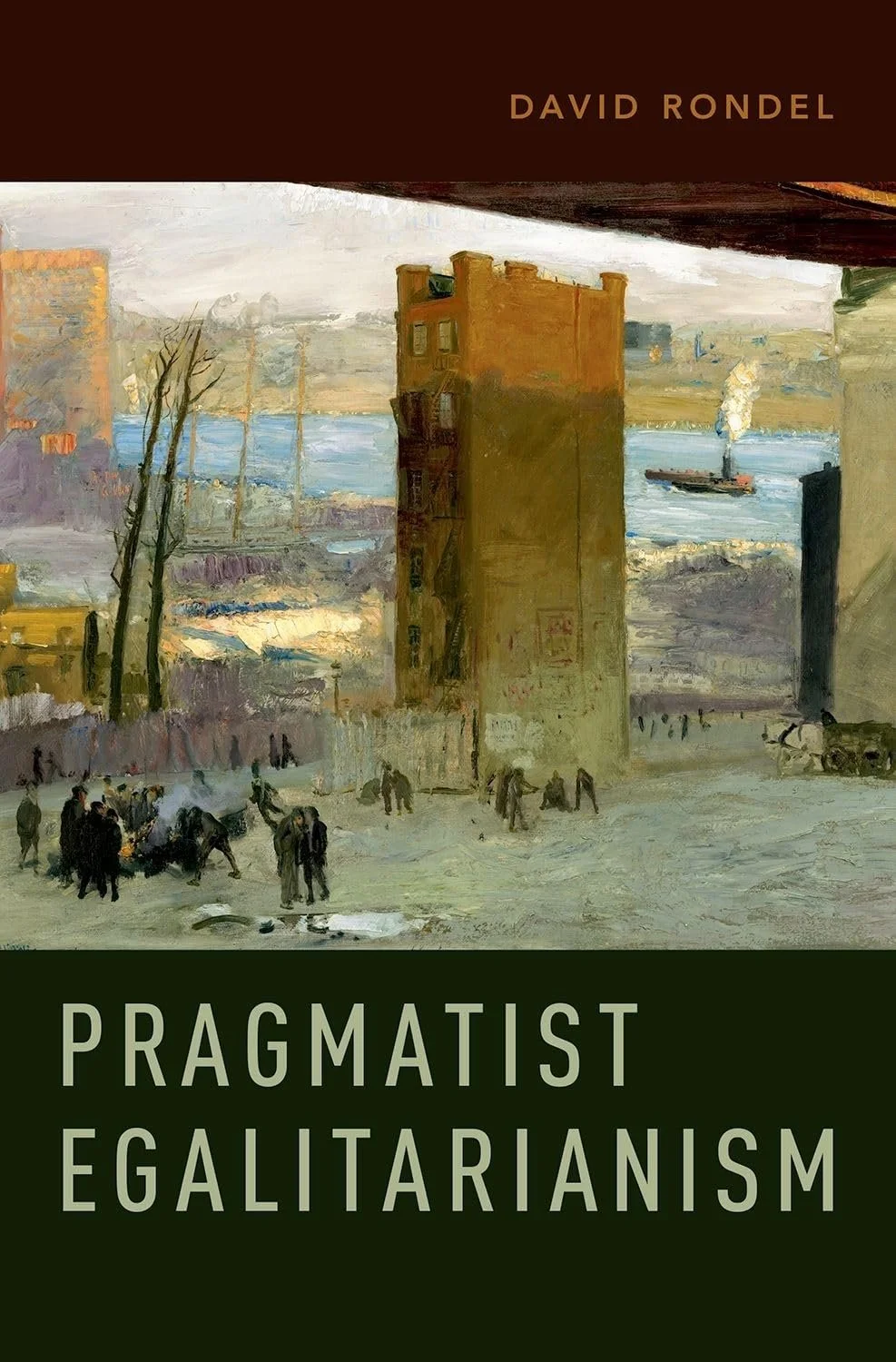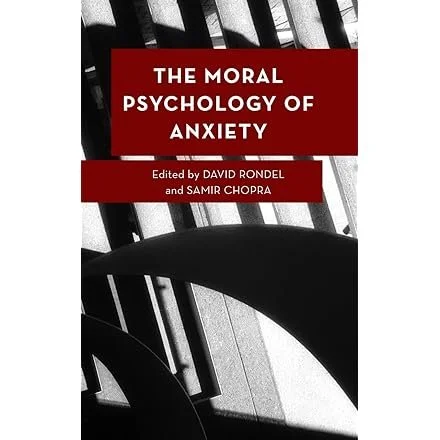“This is a fascinating, detailed, and beautifully-written philosophical examination of one of the most prominent and important phenomena of our times: anxiety. Rondel blends historical expertise, personal testimony, and philosophical argumentation to show how anxiety and philosophy are ‘joined at the hip’, and how a close focus on the works of great philosophers can help us better understand the nature and meaning of anxiety. It is a splendid book.”
Michael Brady, University of Glasgow
“A Danger Which We Do Not Know examines anxiety both philosophically, but also importantly as we live it. This is anxiety not necessarily as a disorder or a medical diagnosis, but as an integral part of the human experience. Drawing on both historical and contemporary philosophy as well as poetry and memoir, A Danger Which We Do Not Know provides a fresh look at the emotion we both know so well and yet understand so little.”
Krista Thomason, Swarthmore College
"Rondel's book offers some interesting new insights on the nature of the ideal of equality. His reconciliatory aim regarding distributive and relational views is laudable, and he offers some good arguments in its favor... his book is helpful reading for philosophers interested in the recent debate about whether the ideal of equality is distributive or relational in nature - or indeed both as Rondel argues."
Kasper Lippert-Rasmussen, Notre Dame Philosophical Reviews
"Rondel's book is a model of clarity and philosophical discussion, deeply informed by the relevant literature, and illuminating on a host of topics. ... [Rondel] has produced a nuanced framework in which to think clearly about how to achieve an egalitarian society. Highly recommended."
W. M. Curtis, CHOICE
"In this remarkable new study, David Rondel breathes new life into pragmatist political thinking by proposing a pragmatist egalitarianism that can take a place within the broader arena of current political philosophy. Although Rondel has not settled the matter of what pragmatists should think about justice, he has made a compelling case for a distinctively pragmatist egalitarianism, and, more importantly, opened a fresh debate among pragmatist philosophers."
Robert B. Talisse, Vanderbilt University
"Rondel has engaged deeply with the imposing literature on the political philosophy of egalitarianism. A really interesting, engagingly written, and thoughtful book."
Matthew Festenstein, University of York
"An original contribution to political philosophy...puts pragmatist philosophy to work in new ways."
Russell Goodman, The University of New Mexico
Edited by David Rondel and Samir Chopra, The Moral Psychology of Anxiety presents new work on the causes, consequences, and value of anxiety. Straddling philosophy, psychology, clinical medicine, history, and other disciplines, the chapters in this volume explore anxiety from an impressively wide range of perspectives. The first part is more historical, exploring the meaning of anxiety in different philosophical traditions and historical periods, including ancient Chinese Confucianism, twentieth-century European existentialism, and the Roman Stoics. The second part focuses on a cluster of questions having to do with anxiety’s nature and significance: Is anxiety something biological or cultural, or perhaps both? What is at the root of anxiety? Why should human beings suffer in this way? What is the experience of anxiety like, and what, if anything, are the benefits associated with it? Does anxiety have the potential to make us more virtuous or improve the quality of our inquiry? Addressing an area where newer work in moral psychology is sorely needed, this collection and the varied perspectives it offers will be of great interest to scholars, professionals, and students across philosophy, psychology, and related fields.
REVIEWS
“Is anxiety a medical illness, a philosophical problem, or a spiritual condition? Is it something to be understood in biological terms or as a cultural condition, a function of the times we live in? This wonderful, cross-disciplinary collection brings together contributions that tackle anxiety under one or more of these headings and advances our understanding of the good, the bad, and the ugly of anxiety.”
Raffaele Rodogno, University of Lausanne
This Companion provides a systematic introductory overview of Richard Rorty's philosophy. With chapters from an interdisciplinary group of leading scholars, the volume addresses virtually every aspect of Rorty's thought, from his philosophical views on truth and representation and his youthful obsession with wild orchids to his ruminations on the contemporary American Left and his prescient warning about the election of Donald Trump. Other topics covered include his various assessments of classical American pragmatism, feminism, liberalism, religion, literature, and philosophy itself. Sympathetic in some cases, in others sharply critical, the essays will provide readers with a deep and illuminating portrait of Rorty's exciting brand of neopragmatism.
REVIEWS
“The Rorty presented in this book is a fresh and interesting one: someone with deep significance for ethics and politics, and someone whose relations with the pragmatist tradition are more fruitful than was long supposed. With any luck, The Cambridge Companion to Rorty will provoke interest in him in a new generation of readers.”
Robert Piercey, Philosophy in Review
The essays in this volume answer to anxieties that the pragmatist tradition has had little to say about justice. While both the classical and neo-pragmatist traditions have produced a conspicuously small body of writing about the idea of justice, a common subtext of the essays in this volume is that there is in pragmatist thought a set of valuable resources for developing pragmatist theories of justice, for responding profitably to concrete injustices, and for engaging with contemporary, prevailing, liberal theories of justice. Despite the absence of conventionally philosophical theories of justice in the pragmatist canon, the writings of many pragmatists demonstrate an obvious sensitivity and responsiveness to injustice. Many pragmatists were and are moved by a deep sense of justice-by an awareness of the suffering of people, by the need to build just institutions, and a search for a tolerant and non-discriminatory culture that regards all people as equals. Three related and mutually reinforcing ideas to which virtually all pragmatists are committed can be discerned: a prioritization of concrete problems and real-world injustices ahead of abstract precepts; a distrust of a priori theorizing (along with a corresponding fallibilism and methodological experimentalism); and a deep and persistent pluralism, both in respect to what justice is and requires, and in respect to how real-world injustices are best recognized and remedied. Ultimately, Pragmatism and Justice asserts that pragmatism gives us powerful resources for understanding the idea of justice more clearly and responding more efficaciously to a world rife with injustice.
REVIEWS
"Pragmatism and Justice, a multi-author volume, is conceptually organized and masterfully ordered, such that it reads less like a collection of disjointed essays and more like a philosophical chain novel, where each contribution picks up where the previous one left off... I recommend it to all philosophers interested in ethics, politics, or law, and those committed to resisting contemporary social injustice... this collection would work well in an upper level course on ethics and politics or as a supplement to primary works in a course on pragmatism, and I recommend it to anyone interested in theoretical reflections on justice and those aiming to resist contemporary injustices."
Seth Vannatta, Contemporary Pragmatism
"This carefully assembled, well-structured, and timely collection of eighteen articles, some previously published, most not, provides a wealth of valuable insight, often from interdisciplinary perspectives, concerning how pragmatism can and should contribute to some of the central debates in modern political philosophy. ... Pragmatists should discover much that is heartening. They will encounter refreshing new takes on a myriad of pragmatist thinkers, some famous, others less familiar. And many will no doubt appreciate how the contributors have enhanced, retrieved, and brought to life the radical thrust of pragmatist thought."
Alan Malachowski, Notre Dame Philosophical Reviews
“Overall, the book achieves what it sets out to do: it begins to solve the mystery of what pragmatists might be able to say about justice, and why they haven’t said much about it until now. But, more importantly, the collection also represents the beginning of an interesting research project, indicating potential areas of future work, connections with other traditions, and staking out the key positions for further debate. As such, the collection represents a resource that will be repeatedly returned to as this area of research develops.”
Neil W. Williams, Contemporary Political Theory
Kai Nielsen is one of Canada’s most distinguished political philosophers. In a career spanning over 40 years, he has published more than 400 papers in political philosophy, ethics, meta-philosophy, and philosophy of religion. He has engaged much of the best work in Anglophone political philosophy, shedding light on many of the central debates and controversies of our time but throughout has remained a unique voice on the political left.
Pessimism of the Intellect, Optimism of the Will presents a thoughtful collection of Nielsen’s essays complemented by an extended reflective interview with Nielsen. This collection allows the reader to grasp the systematic scope of his thought and methodology.
REVIEWS
“In this collection of some of his most notable and influential recent papers, Kai Nielsen provides an impressive restatement of the ‘radical’ liberal egalitarianism for which he is well-known and provides a provocative attempt to reconcile two positions in current global justice debates that are often thought incompatible — viz. liberal nationalism and cosmopolitanism.”
Alistair M. MacLeod, Emeritus Professor of Philosophy, Queen’s University
“Rondel and Sager exhibit great tact and ingenuity in their editing. It is clear that they possess great familiarity with Nielsen’s work . . . Pessimism of the Intellect, Optimism of the Will will remain a hugely informative, supremely readable thought-provoking anthology of a highly influential political philosopher.”
Karolina Wisniewski, Dialogue


